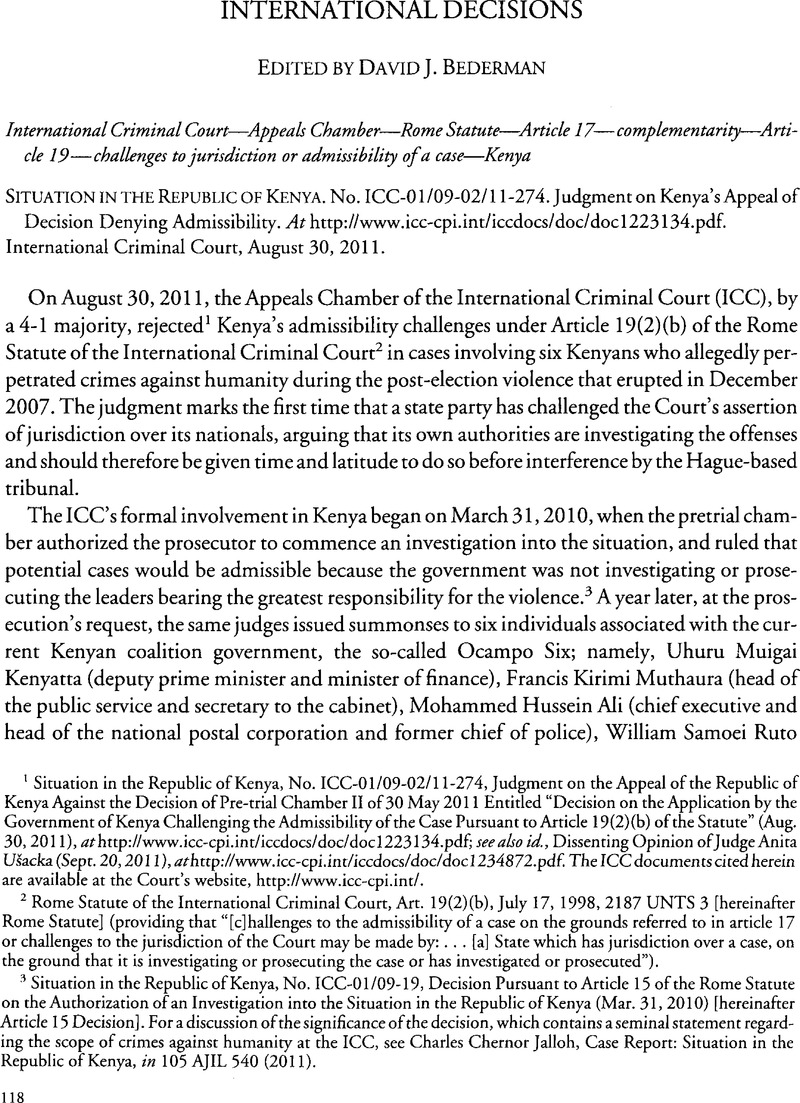Published online by Cambridge University Press: 20 January 2017

1 Situation in the Republic of Kenya, No. ICC-01/09-02/11-274, Judgment on the Appeal of the Republic of Kenya Against the Decision of Pre-trial Chamber II of 30 May 2011 Entitled “Decision on the Application by the government of Kenya Challenging the Admissibility of the Case Pursuant to Article 19(2)(b) of the Statute” (Aug. 30, 2011), at http://www.icc-cpi.int/iccdocs/doc/doc1223134.pdf; see also id., Dissenting Opinion of Judge Anita Ušacka (Sept. 20,2011), at http://www.icc-cpi.mt/iccdocs/doc/doc1234872.pdf. The ICC documents cited herein are available at the Court’s website, http://www.icc-cpi.int/.
2 Rome Statute of the International Criminal Court, Art. 19(2)(b), July 17, 1998, 2187 UNTS 3 [hereinafter Rome Statute] (providing that “[c]hallenges to the admissibility of a case on the grounds referred to in article 17 or challenges to the jurisdiction of the Court may be made by:…[a] State which has jurisdiction over a case, on the ground that it is investigating or prosecuting the case or has investigated or prosecuted”).
3 Situation in the Republic of Kenya, No. ICC-01/09-19, Decision Pursuant to Article 15 of the Rome Statute on the Authorization of an Investigation into the Situation in the Republic of Kenya (Mar. 31, 2010) [hereinafter Article 15 Decision]. For a discussion of the significance of the decision, which contains a seminal statement regarding the scope of crimes against humanity at the ICC, see Charles Chernor Jalloh, Case Report: Situation in the Republic of Kenya, in 105 AJIL 540 (2011).
4 See Situation in the Republic of Kenya, No. ICC-01/09-01/11, Decision on the Prosecutor’s Application for Summons to Appear for William Samoei Ruto, Henry Kiprono Kosgey, and Joshua Arap Sang (Mar. 8,2011); No. ICC-01/09-02/11, Decision on the Prosecutor’s Application for Summonses to Appear for Francis Krimi Muthaura, Uhuru Muigai Kenyatta, and Mohammed Hussein Ali (Mar. 8, 2011).
5 Situation in the Republic of Kenya, No. ICC-01/09-01/11-101, Decision on the Application by the government of Kenya Challenging the Admissibility of the Case Pursuant to Article 19 (2) (b) of the Statute (May 30,2011).
6 Rome Statute, supra note 2, Art. 17(l)(a) (emphasis added).
7 Quoting Situation in the Republic of Kenya, Nos. ICC-01/09-01/11 & ICC-01/09-02/11, Application on Behalf of the government of Kenya Pursuant to Article 19 of the ICC Statute, para. 32 (Mar. 31, 2011) (emphasis added) (characterizing the test as that used in the pretrial chamber’s Article 15 Decision, supra note 3).
8 Pre-trial Chamber I formulated this test in Situation in the Democratic Republic of the Congo, No. ICC-01/04-01/06-8-Corr., Decision on the Prosecutor’s Application for a Warrant of Arrest, Annex I, paras. 31, 37 (Feb. 10, 2006).
9 The judicial composition is interesting. The majority included two African judges: Daniel Nsereko of Kenya’s neighbor Uganda, who presided; and Akua Kuenyehia of Ghana. The other majority judges were Sang-Hyun Song of the Republic of Korea and Erkki Kourula of Finland. The lone dissenter was Anita Ušacka of Latvia.
10 The preamble to the Rome Statute, supra note 2, and Article 1 emphasize that the ICC “shall be complementary to national criminal jurisdictions.” For Article 17(l)(a), see text at note 6 supra.
11 Id., pmbl.
12 See Kenyan National Dialogue and Reconciliation, Annotated Agenda and Timetable at A)2 (Feb. 1, 2008), at http://www.dialoguekenya.org/docs/Signed_Annotated_Agenda_Feblst.pdf; see also Commission of Inquiry into the Post Election Violence, Report (Oct. 15, 2008), at http://www.dialoguekenya.org/docs/PEVReportl.pdf.
13 Rome Statute, supra note 2, Art. 18(2) (providing: “Within one month of receipt of that notice [from the prosecutor indicating intent to begin an investigation], a State may inform the Court that it is investigating or has investigated its nationals or others within its jurisdiction with respect to criminal acts which may constitute crimes referred to in article 5 and which relate to the information provided in the notification to States. At the request of that State, the Prosecutor shall defer to the State’s investigation of those persons unless the Pre-Trial Chamber, on the application of the Prosecutor, decides to authorize the investigation.”). On the other hand, Article 19(10) of the Rome Statute gives the prosecutor the right to request a review of a decision holding a case inadmissible before the ICC if new facts arise to negate the basis upon which it was predicated. Thus, a case previously found inadmissible could be rendered admissible because of changed circumstances, thereby giving states further incentives to ensure good-faith investigations and prosecutions.
14 Situation in the Republic of Kenya, No. ICC-01/09-63, Decision on the Request for Assistance Submitted on Behalf of the government of the Republic of Kenya Pursuant to Article 93(10) of the Statute and Rule 194 of the Rules of Procedure and Evidence, paras. 33-34 (June 29, 2011); id., No. ICC-01/09-78, Decision on the Admissibility of the “Appeal of the government of Kenya Against the ‘Decision on the Request for Assistance Submitted on Behalf of the government of the Republic of Kenya Pursuant to Article 93(10) of the Statute and Rule 194 of the Rules of Procedure and Evidence,’” para. 21 (Aug. 10, 2011) (holding, as inadmissible, Kenya’s appeal of the decision denying the request for cooperation).